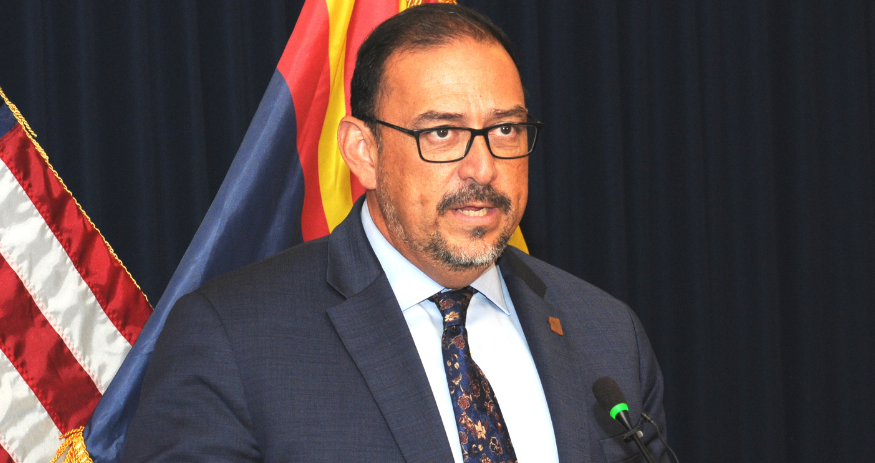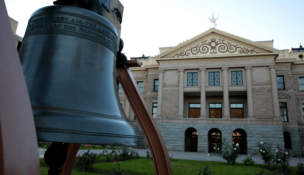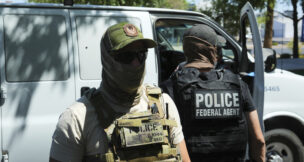Arizona Supreme Court asked to address nearly 100,000 voters made ineligible by 2005 law
Howard Fischer, Capitol Media Services//September 17, 2024//
Arizona Supreme Court asked to address nearly 100,000 voters made ineligible by 2005 law
Howard Fischer, Capitol Media Services//September 17, 2024//
PHOENIX – The Arizona Supreme Court is being asked to decide whether close to 100,000 registered voters can cast a ballot in upcoming state and local elections.
A pair of lawsuits being filed today ask the justices to decide how the state and counties must deal with the fact that there is no evidence that close to 2.5% of all voters have not provided the legally required “documented proof of citizenship.” That makes them legally ineligible to vote a full ballot under the terms of a law that took effect Jan. 24, 2005.
Maricopa County Recorder Stephen Richer wants the court to declare that the affected individuals will be able to vote only in federal races. That’s because federal law has no such proof-of-citizenship requirement to cast a ballot for president, Senate or House.
But Secretary of State Adrian Fontes is filing his own legal papers, saying there is no reason to believe that virtually all of these people – many of whom have been voting for years – are not actually citizens, even if the paperwork is missing. He said all have signed forms swearing, under penalty of perjury, that they are eligible to cast a ballot.
There’s also the chaos it would cause so close to the election.
Both Richer and Fontes describe their litigation as “friendly,” designed to get a clear decision from the Supreme Court – perhaps by the end of the week.
Speed is crucial.
Overseas ballots are supposed to go out by Friday. And early ballots will be mailed in less than a month.
What’s behind the last-minute scramble is that a check of records by Richer’s office found that someone who was presumed registered to vote in all elections had never provided the legally required “documented proof of citizenship.” And that, he said, means that person had not complied with that 2005 law.
Fontes said that discovery led his own agency to take a closer look at others in the voter rolls. And what his staff found, he said, was something close to 98,000 who are in the same situation.
The secretary of state stressed stressed this wasn’t intentional, saying many of these people have been voting for years – and their ballots have been accepted – under the premise they were in compliance with the law.
Still, it is likely to rekindle complaints by some who insist that the state’s election rolls are packed with people who are ineligible. That includes a federal court lawsuit by a conservative group which is accusing all 15 county recorders of failing to do their jobs to ensure that only citizens are voting.
It starts with that 2005 law which imposed the state’s first-ever requirement for proof of citizenship to register, a requirement that exists nowhere else in the country.
But that law also says anyone registering from that point forward who already had a driver’s license issued after Oct, 1, 1996 is presumed to be legally registered. That’s the effective date of a law signed by then-Gov. Jan Brewer that individuals needed to prove legal presence to get a license.
And the same law essentially grandfathered in as presumed to be a citizen anyone whose license is older than that, all without having to provide new citizenship proof.
The problem involves those who registered to vote after that 2005 effective date but whose driver licenses predate 1996.
As new registrants, they expect to provide documentary proof of citizenship, regardless of the age of their license. Ditto those who move to another county and reregister to vote there.
That, said Fontes, normally triggers a check of MVD records.
Richer said the problem is that some people who had pre-1996 licenses – the ones without proof of citizenship – have gone to MVD for a duplicate license or to change their address.
The agency, however, used this new issue date indicating the person actually had a post-1996 license – meaning they had provided proof of citizenship – when, in fact, they never had. And county election officials, relying on those MVD records when facing someone trying to register to vote after 2004, never asked for any citizenship proof.
“This data coding oversight resulted in an inaccurate belief that certain people had provided documentary proof of citizenship to the MVD,” according to Fontes’ office.
It only came to light earlier this month.
Maricopa County was checking the citizenship of one person who had one of those older licenses who was updating voter registration. It turned out that this person was a lawfully permanent resident – entitled to an Arizona license under the 1996 law – but not a citizen, with the issue being that MVD coding.
Fontes said despite the registration, that person never cast a ballot.
Now aware of the problem, Fontes said further checks were made across the system. And he believes there are about 98,000 whose records reflect the lack of submission of documentary proof of citizenship.
“We don’t have any reason to believe that anyone in this gap is not an eligible voter,” Fontes said.
“We don’t have any reason to believe that they’re not eligible citizens in spite of the fact that we did find one,” he continued. “All we know is they fit into this category and all of this requires more research.”
But with time running out, the plan was hatched to have Maricopa County ask the Supreme Court for an order spelling out that anyone in this category could cast a federal-only ballot. That is based on that federal law saying people can vote in federal elections without proof of citizenship.
Then, the Secretary of State’s Office would be ready with a response asking the justices to allow those affected to vote in all elections, as they have been doing until now.
“I think that they should,” said Fontes. “Each of these individuals have sworn an affidavit, under penalty of perjury, that they are United States citizens.”
In fact, Fontes said, that is sufficient in the other 49 states to register to vote. Only Arizona requires would-be registrants to provide documentary proof.
But the real goal is to get a definitive decision – which the state Supreme Court should be able to provide – as soon as possible. Fontes said since this is strictly an interpretation of state law, there is no reason for federal court involvement.
He said if the justices conclude that these people are entitled to vote only in federal races there will be an outreach effort to let them know – and not just that they will get a ballot without state and local races, either when early ballots go out or when they show up at the polls.
Fontes said there’s actually another option for those who want to cast a full ballot. He said they can provide proof of citizenship to county officials, the same proof now required of new registrants, right up through 7 p.m. on Election Day.
Not everyone with a pre-1996 license falls into this questionable category, even if they haven’t changed their voter registration.
Fontes said many people have applied for a Real ID. That is an enhanced driver’s license that, among other things, will be required next year to board a commercial aircraft.
And, in getting a Real ID, an applicant had to provide proof of citizenship like a passport, meaning they are, and remain, eligible to vote in all elections.
Fontes also said none of this has any legal effect on prior elections, even if it turns out that someone without the required proof of citizenship voted on a statewide race. He said courts presume that there has to be finality to elections.
Of those affected, Fontes said it appears they are spread out among all the counties in about the same percentages as the number of registered voters.
So, for example, of the slightly more than 4.1 million registered voters, he would expect about 59% of them to be from Maricopa County, 15% from Pima County, close to 6.5% from Pinal County, about 4.1% from Yavapai County and the remainder in proportion to the remaining counties.
Fontes said it also appears that there are more Republicans on the list than Democrats or independents, also largely a function of total registration.
Gov. Katie Hobbs, in a prepared statement, said she identified and fixed what she called an “administrative error” dating back to 2004.
“As soon as I became aware of the problem, I directed MVD to aggressively develop and implement a solution,” she said. Hobbs also said that she “will be implementing an independent audit to ensure that MVD systems are functioning as necessary to support voter registration.”
All of this is occurring as some Republicans on the state and national level, without citing proof, contend that people who are not citizens are affecting federal elections. They are pushing for a national law to require proof of citizenship to vote in federal elections.










































